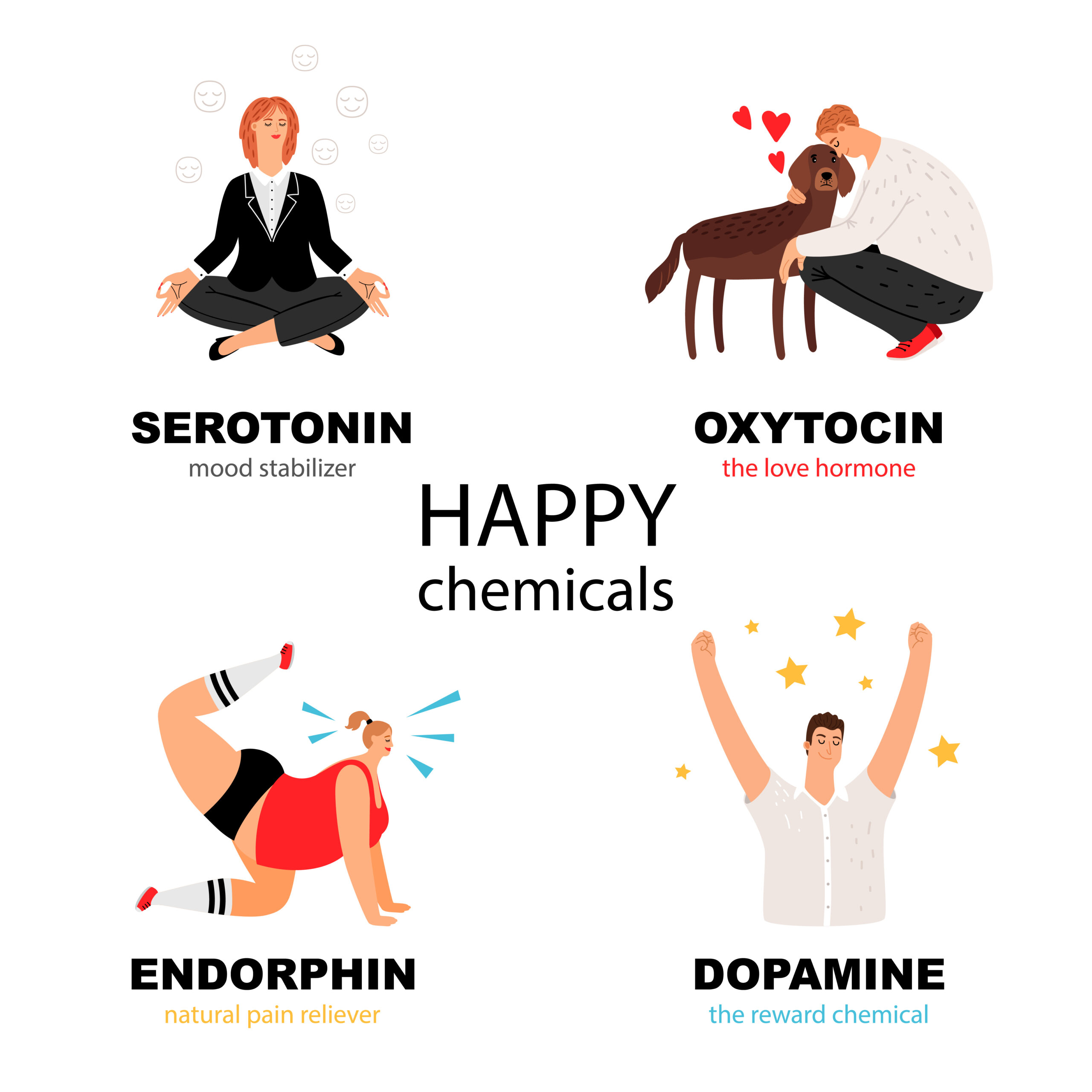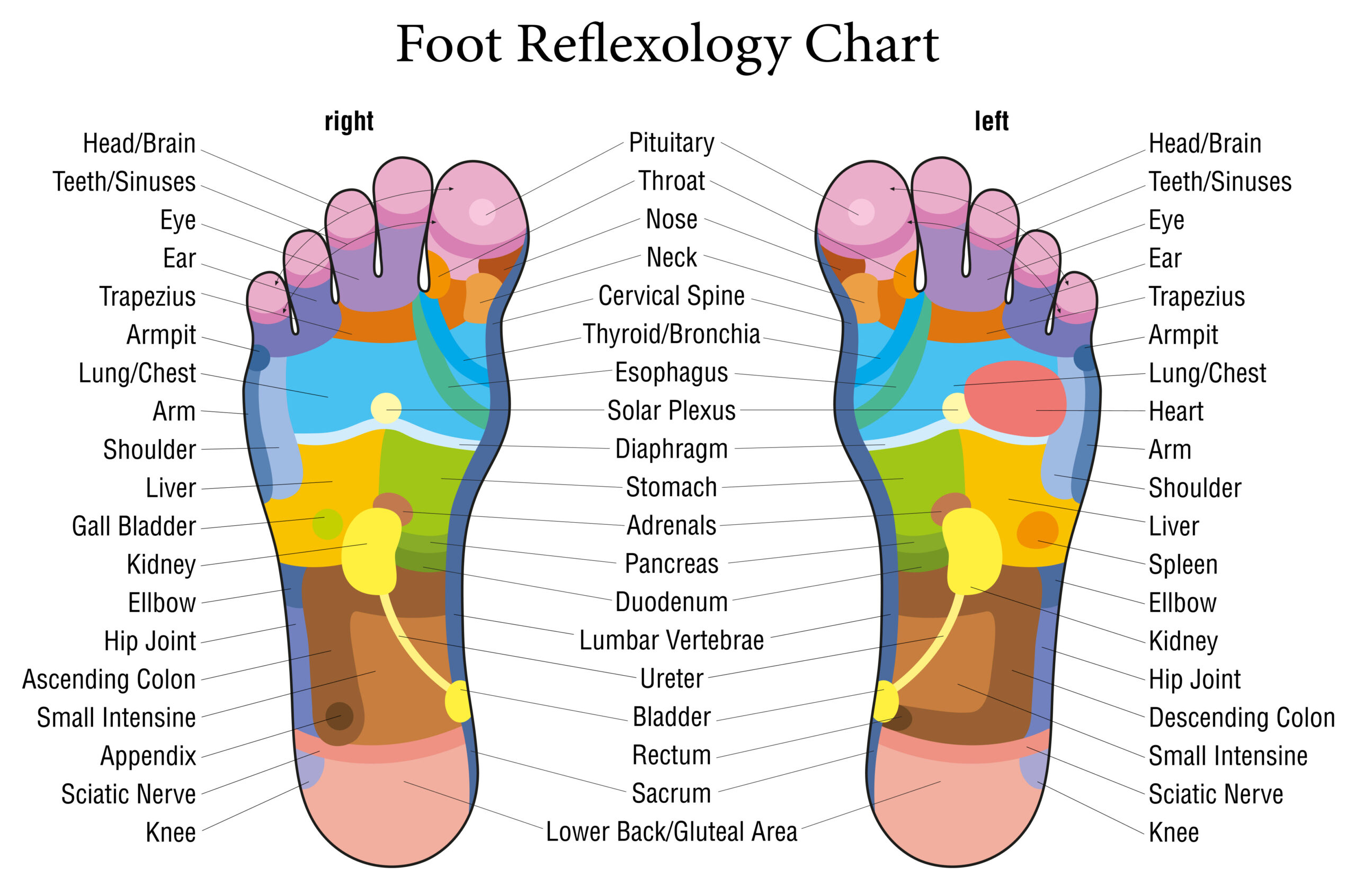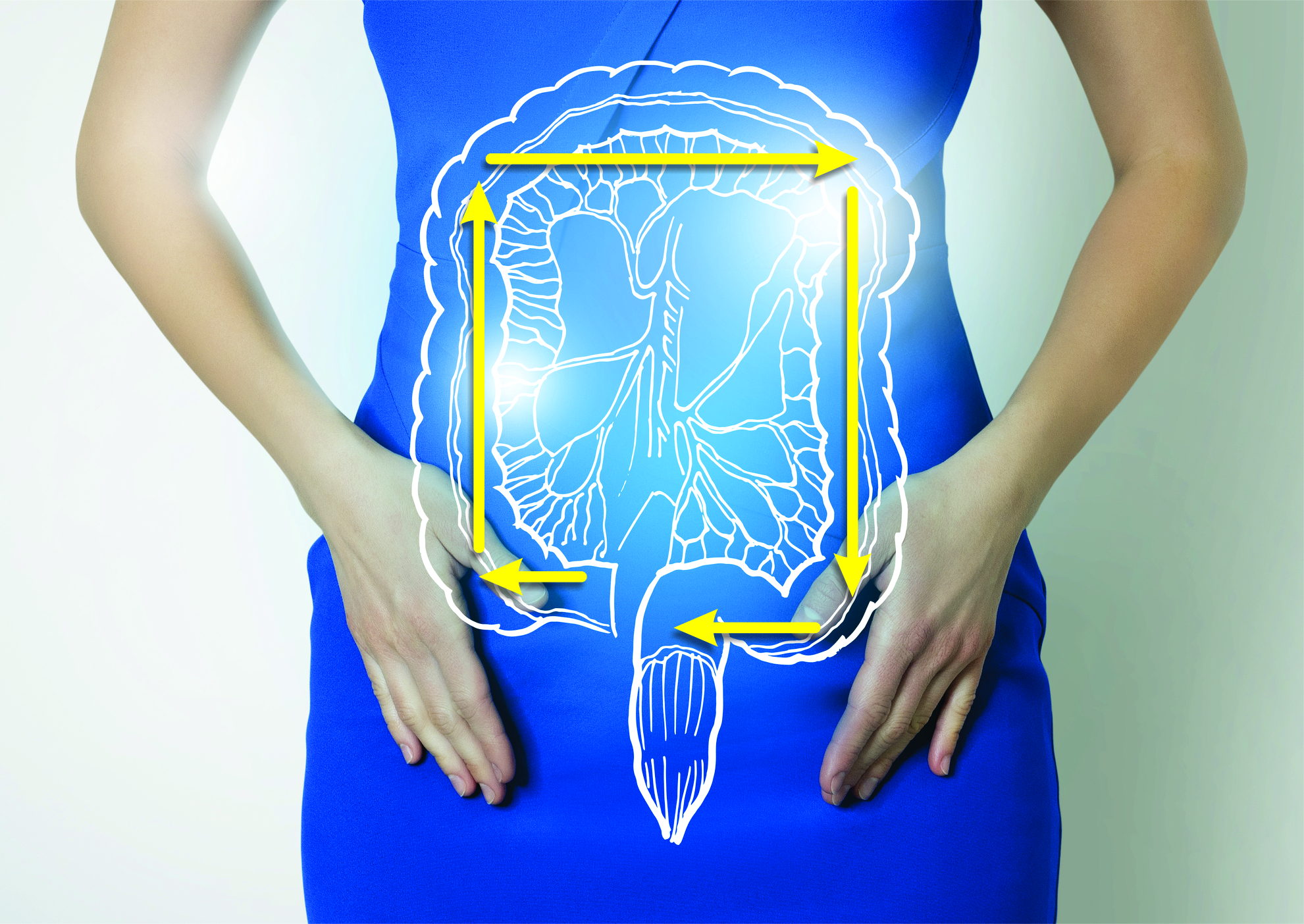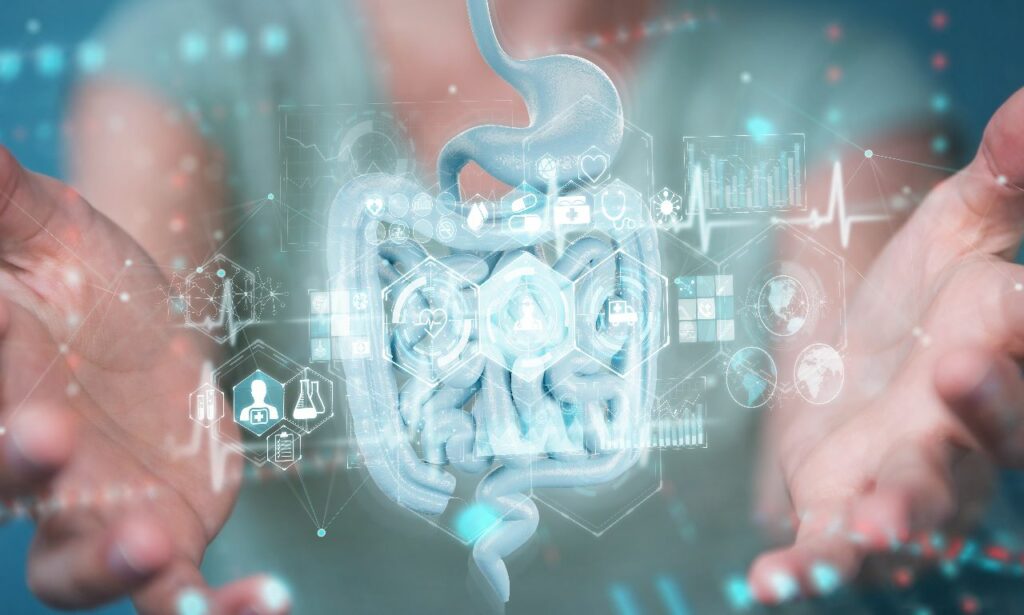Part 1: Love Your Gut – Your Gut as Your Second Brain
(GUT) Digestive system basics: The digestive system is a complex system and is one of the 11 organ systems of the body.
The digestive system consists of:
- A group of organs: Mouth, oesophagus, stomach, small intestine, large intestine or colon, rectum and anus.
- Accessory organs and glands: Salivary glands, liver, gallbladder and pancreas.
The digestive system’s function is controlled by the brain and nervous system. This system is responsible for the digestion and absorption of nutrients in the body and the excretion of toxins and waste.
The gastrointestinal tract (from mouth to rectum) is commonly referred to as the gut, a highly regenerative system in the human body that regenerates its entire lining every five to seven days. Genetic and lifestyle factors (epigenetics) play a crucial role in gut health.
Genetics and epigenetics
Human genetics is the study of genes, genetic variation and heredity in humans and the gut genes that we inherit from our parents may affect our gut health and function. The genes are found in the DNA, inside the nucleus of our cells, that codes for all functions in the body.
Your DNA/genetic code can provide information on your susceptibility to gluten sensitivity, lactose tolerance, inflammatory bowel disease (IBS), leaky gut syndrome, probiotic genes, gut health genes, intestinal bacteria, histamine tolerance and gut inflammation.
It is very important to remember that genetics show your susceptibility to disease, it is not inevitable. There is hope, we are not victims of our genes!
The field known as epigenetics (epi=more important; genetics = than genetic code) highlights the importance of factors that are more important than the genes, that can affect genetic expression, i.e. ‘switch’ genes on and off.
Epigenetic factors include lifestyle behaviour and neural pathways that have a direct effect on the environment surrounding our cells. The information then passes through the cell membrane (via channels or receptors), into the cell and to the nucleus, that then stimulates or inhibits specific genes. These factors are in our control and include water, oxygen (your breathing), nutrients, thoughts, emotions, beliefs (neuroplasticity vs neurorigidity. New networks!).
The cell membrane is therefore the true brain of the cell, not the nucleus (as previously believed by scientists)!
The microbiome
The microbiome is the full complement of the genes contained in all microbes (including bacteria, fungi, viruses, and algae etc. – the oldest form of life on earth). The microbiome is found outside (the skin) and inside (e.g. the gut) the body and also in soil, air, water and other living organisms. It is complementary to the human genome (all of our genes) and the genes in our microbiome outnumber the genes in our genome by about 100 to 1, meaning there is 100 times more genes in the microbiome of our body than inside all our cells.
Gut flora and microbiome terms
Prebiotics are the non-digestible fibre substances that are fermented by the beneficial bacteria in the gut and are used as a source of fuel to help enhance gut flora health.
Probiotics are the live microbes or micro-organisms (incl. bacteria) that can confer health benefits ranging from improved immunity to better brain function. We truly live in a symbiotic relationship with probiotics.
Postbiotics are the by-products of bacterial fermentation in the colon, including vitamins B and K, amino acids, antimicrobial peptides (that slows the growth of harmful bacteria).
Gut bacteria require a healthy gut lining to thrive and imbalances may lead to gut issues including indigestion (heartburn), food sensitivities, bloating, diarrhoea, constipation, candida infections, IBS (irritable bowel syndrome), leaky gut syndrome, lazy bowel, stomach cramps, pain, weight gain, acne/skin problems, fatigue, sleep disturbances, autoimmune diseases, mood swings and depression.
The gut-brain axis
The gut is known as the second brain due to the complex neural connections or pathways (neurons) running from the gut to the brain and vice versa. The gut alone is enervated by over 100-million neurons (nervous system cells). This connection between the gut and brain is known as the gut-brain axis (GBA).
Cranial nerve X, known as the vagus nerve, is critical for supplying parasympathetic (known as the rest and digest nervous system) information to visceral organs of the respiratory, digestive and urinary systems. It is important in the control of heart rate, bronchoconstriction and digestive processes. There are three ways that the GBA work together:
- Neurotransmitters and serotonin – 90 per cent of serotonin is produced in the gut. These neurochemicals regulate appetite, mood and stimulate the vagus nerve that changes activity in many brain regions and affects hunger levels. (Glucagon-like peptide – GLP receptors in gut and posterior brain, heart, lungs, etc)
- Gut microbes stimulate immune cells that signal the brain. E.g. gut microbes can prompt immune cells to produce and release small proteins called cytokines – involved in immune response, inflammation.
- Through metabolites, molecules produced by microbes in the gut, certain gut-microbe-derived fatty acids (e.g. butyrate, tyramine) send signals to cells that line the digestive tract, to increase serotonin production. The increased serotonin stimulates the vagus nerve or enter the bloodstream and travel to the brain.
Brain to gut
Stress, anxiety, mental health challenges have physiological responses in the body, for example affecting gut motility and function that may result in symptoms such as stomach pain and constipation.
Gut to brain
The enteric nervous system (in the gut) produces neurotransmitters (incl. serotonin and metabolites) that may contribute to mental health including stress, anxiety and depression.
The happiness molecules and how to hack them
Here are some ways to support and balance your happiness molecules:

Part 2: Love Your Gut – Your Gut Is Your Second Brain
Healing the gut holistically: For a healthy, happy gut it is important to follow an anti-inflammatory lifestyle inside and out. An holistic approach for long term gut health comprises adequate sleep, stress management (incl. breathing and relaxation), anti-inflammatory foods (foods rich in micronutrients, digestive enzymes, probiotics and amino acids), mindful movement, conscious eating, listening to your gut feelings (intuition), herbal remedies and nutraceuticals (or food supplements) if necessary.
Nutrients and gut health: Nutrients can be subdivided into macronutrients and micronutrients. Macronutrients are nutrients we need in large quantities and are converted to energy to keep all the body systems working. Macronutrients include carbohydrates (used for fuel/energy), protein (for growth, hormones and repair of the body), fats (for fuel/energy and to provide essential fatty acids) and water (to maintain body fluid and regulate body temperature).
Micronutrients are nutrients needed in small quantities, including vitamins, minerals and herbs. Functions of micronutrients:
- Energy production;
- Blood clotting;
- Growth/developing body tissue;
- All organ system health (digestive, bone, heart, immune, nervous, muscle, skin, reproductive and respiratory);
- All metabolic processes.
Anti-inflammatory foods: Include foods that are whole, raw and superfoods that are unprocessed, organic, unrefined, fresh, plant based. The best is to get organic produce or grow your own.
Anti-inflammatory superfoods (foods that contain high quantities of micronutrients and antioxidants) include berries, nuts, seeds, pulses/legumes, cereal grains, grasses (wheatgrass, brown rice, oats), plant oils, algae (e.g. spirulina), raw honey, bee pollen, garlic, mushrooms (e.g. lion’s mane, shiitaki, maitake, porcini), sprouts, aloe ferox (great for lazy gut), seaweed (e.g. nori found in sushi dishes) and raw cacao (beans, nibs, powder, butter).
High fibre foods may exert anti-inflammatory effects by helping control blood glucose, insulin, fat and cholesterol levels. Be careful with high fibre foods if you have IBS. Fibre is also essential for a healthy gut, to soften stool and for optimal bowel movement.
Fresh fruits and vegetables are great sources of fibre and wholesome, raw, super foods. Eat the rainbow, i.e. different colours and textures; also make seasonal choices. In order to get in enough micronutrients and fibre we need to consume five to nine portions of fruits and vegetables per day. Antioxidants found in fruit and vegetables are crucial for gut health.
Omega-3 is an essential (meaning our bodies can’t make it) fatty acid and includes oily fish such as salmon/trout, snoek, sardines, anchovies, which activate anti-inflammatory genes. Unsaturated fats (in plant oils) including nuts, seeds, avocado and oils (inclucding olive, coconut, grapeseed and flaxseed).
Red meat and alcohol can cause inflammation, therefore limit these foods in your diet.
Complex carbohydrates that are gut-friendly are wholegrains including steelcut oats, seed crackers, basmati, brown/wild rice, cold potato, sweet potato, barley, lentils, spelt, seven grains, quinoa and split peas.
Consume food that is rich in digestive enzymes if you struggle with low energy levels, bloating, constipation, diarrhoea, heartburn, cramps/pain after meals, reflux, IBS or lactose intolerance. These include papaya, pineapple, avocado, kiwi, bananas, raw honey, kefir/kombucha, fermented food, mango and ginger.
Pre and probiotics: We also recommend taking pre- and probiotics to aid digestion, heal the gut and to restore the balance of healthy bacteria in your gut (microbiome). This will reduce gut inflammation and improve gut health. Prebiotics (fibre that feeds friendly gut bacteria) include asparagus, onion, artichokes, garlic, ginger, leeks.
Probiotics (beneficial bacteria) found in the gut includes Lactobacillus acidophilus (mostly small intestine) and Bifidobacterium bifidum (mostly large intestine) – yoghurt (live, cultured), kombucha, kefir, fermented foods or a probiotic supplement.
Benefits:
- Support immune system and reduce allergies;
- Reduction in yeast and other infections; i.e. balances gut flora;
- Reintroduction of healthy bacteria and inhibition of disease-causing organisms;
- Improved digestion, increased nutrient absorption and vitamin synthesis;
- Detoxification and protection from toxins;
- Prevention of diarrhoea;
- Reduces the risk of IBS;
- Cancer-protective effects;
- Improve mental health;
- Promote weight loss.
Help from nature’s pharmacy to support gut health
Herbs: Boswellia serrata, aloe, ginger, bromelain (pineapples), papain (papaya), devil’s claw, liquorice root, buchu, fennel, yarrow, black pepper, rosemary, basil, cardamom, chives, cloves, garlic, parsley, peppermint, cancer bush, rooibos.
Anti-inflammatory hot toddy: pinch each of turmeric, ginger, cinnamon in hot water, before meals to support digestion.
Essential plant oils: Arnica, thyme, rose, orange, clove, eucalyptus, bergamot and fennel oil.
Epsom salts: Take a bath with Epsom salts, add an essential oil for aromatherapy and relax to activate the parasympathetic nervous system (‘rest and digest’ nervous system).
Basic nutraceutical food supplements for gut health
Basic 3 (‘Insurance premium’)
- Heart-brain-body support – super antioxidant;
- Calcium and magnesium – ratio and chelated, Vit D, C, boron, potassium;
- Omega – 3,6,9.
Neuro Balance
Lion’s mane, gingko biloba, ashwgandha.
Liver support/balance
Milk thistle, kudzu extract, N-acetyl L-cysteine, alpha lipoic acid, dandelion and green tea extract.
Innercise and exercise for gut health
Innercise – relaxation: Learn to keep your mind, emotions and body quiet or silent with relaxation or meditation practices. You do not have to be an expert, start with simple breathing practices. Breathing is the only quick fix when it comes to your health. Deep, slow breathing activates the parasympathetic nervous system, also known as your rest and digest nervous system. To promote gut health and optimal digestion and absorption of food, you need to be in a calm and relaxed state. So many of us experience gut related issues (stomach pain/discomfort after eating, bloating) because we are in a stressed state.
Belly breathing: Belly breathing is a great way to calm down your body. Put your hand on your belly and take a deep inhale, while feeling your belly expand. Take five to ten deep breaths, making the exhale longer than the inhale and you will already feel the calming effect. Do it as often as possible, while driving, before eating, any chance you get!
Reflexology points: Massage your feet over the instep, this region represents the digestive system.

Gut massage: Massage your gut from right hip upwards towards the right ribs, then across and down the left towards the left hip and back to the starting point. This is excellent to stimulate peristalsis (or gut motility), if you experience a lazy gut. The direction is important, as this is how the colon or large intestine flows.

Exercise
Regular fun fitness (swimming, walking, dancing, Yoga) changes the gut microbiome:
- Reduces inflammation and neutralises the effects of stress in the gut;
- Several weeks of exercise showed an increase in butyrate (fatty acid that keeps our guts happy) that reduces inflammation and produces energy;
- Results in a more diverse gut microbiome;
- HIIT (high intensity interval training) increases probiotics in your gut;
- After six weeks of exercise, the gut makeup turned from abnormal to normal;
- Strength training: beneficial for gut cells and reduces inflammation;
- Yoga is a great exercise to promote gut health.
The science behind gut feelings: There is a deep neurological basis for intuition. The gut is known as the second brain, because there are more than 100 million neurons that innervate the gut. There is also a complex connection between the gut and the brain (refer to Part 1).
Intuitive decision-making is when the brain and gut work together to access memories, past learnings, personal needs and preferences in order to make the wisest decision for you. In this way; intuition is a form of emotional and experiential data.
Even if you don’t listen to it regularly, you still benefit from it daily, e.g. choosing to take a different route home (due to a gut feeling) and then later finding out you missed a two-hour traffic jam; mindfully become aware of the hollow feeling in your gut when you feel you made the wrong decision or the butterfly sensation in your gut when you just know that you’re in alignment or made the right decision.
Starting to follow your gut can make your life easier! So how can we do this?
Trust your intuition – it takes practice, patience and perseverance.
It is a journey to find balance in your gut and in your life. It is so worth it!
Written by Dr Arien van der Merwe and Anri van Rooyen
For more info on topic and relevant online courses: www.ArianiHealth.com


